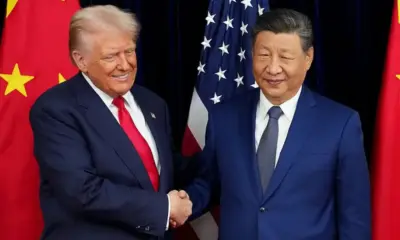Politics
UK Cabinet Announces New Immigration Framework for Skilled Workers

The UK government has unveiled a new immigration framework designed to attract and retain skilled workers across key sectors of the economy. The policy, announced following a cabinet meeting at Downing Street, aims to simplify visa procedures, address labor shortages, and support long-term economic growth. Ministers have described the framework as one of the most significant reforms to Britain’s immigration system since the post-Brexit transition, emphasizing that it balances openness with control.
A Modern System for a Changing Economy
The new framework introduces a streamlined points-based system that prioritizes high-demand professions such as healthcare, technology, engineering, and renewable energy. Applicants will be assessed on a combination of qualifications, work experience, and salary thresholds rather than country of origin. The government has pledged to make the process more transparent, reducing waiting times and paperwork for both employers and applicants.
Under the updated rules, international workers in critical industries will have access to fast-track visa processing. Employers will be encouraged to sponsor skilled migrants through a simplified digital platform designed to ensure compliance while minimizing administrative burdens. The new system also expands opportunities for recent graduates from leading global universities to work in the UK without immediate sponsorship requirements.
According to Home Office officials, the framework is intended to support the country’s long-term labor strategy and address workforce shortages that have affected several industries since the pandemic. The healthcare sector, construction, and information technology have been particularly impacted by labor gaps. The government hopes the policy will help stabilize these sectors while reinforcing Britain’s image as a global hub for innovation and talent.
Critics, however, argue that the reforms could still favor large corporations over small businesses due to the complexity of sponsorship requirements. Some industry groups are calling for additional measures to support small and medium enterprises in recruiting international talent. The Home Office has responded by pledging further consultations with employers to ensure the system remains fair and accessible.
Economic Goals and Political Context
The timing of the announcement reflects both economic necessity and political strategy. With the 2026 general election on the horizon, Prime Minister Rishi Sunak and his cabinet are under pressure to demonstrate that the government can deliver policies that promote growth while maintaining border security. Immigration has long been a politically sensitive issue in Britain, with debates often centered on balancing economic benefits with public concerns about population pressures.
By focusing on skilled migration, the government seeks to move the conversation away from raw immigration numbers toward economic contribution. Ministers have argued that the new system supports fiscal responsibility by attracting professionals who will contribute to tax revenues and reduce long-term dependency on social welfare. The Treasury has projected that expanding the skilled labor pool could add billions to the UK’s GDP over the next decade, particularly in fast-growing industries such as artificial intelligence and clean energy.
The new policy also aims to strengthen regional economies outside London. Companies in Scotland, Wales, and Northern England will receive priority access to skilled visa allocations for sectors facing acute shortages. This aligns with the government’s levelling-up agenda, which seeks to distribute growth more evenly across the country. Regional business chambers have welcomed this approach, describing it as a meaningful step toward revitalizing local labor markets.
However, opposition parties have raised questions about the government’s long-term commitment to fair wages and labor standards. Labour representatives have warned that immigration reform must not become a substitute for domestic workforce development. They argue that investment in education, vocational training, and apprenticeships remains essential to ensuring that British workers can compete in a globalized economy.
Industry and International Reaction
The announcement has drawn a largely positive response from business leaders, who see it as a pragmatic step toward addressing chronic labor shortages. The Confederation of British Industry praised the framework as “a competitive model for the modern economy,” while the Federation of Small Businesses emphasized the need for ongoing consultation to ensure equitable access across all industries.
International observers have also taken note. The new framework is seen as part of Britain’s post-Brexit strategy to define itself as an independent global economy capable of attracting top-tier talent. Diplomatic partners from the Commonwealth and Asia-Pacific regions have welcomed the potential for greater mobility and collaboration in science, engineering, and education.
Universities across the UK have also expressed optimism that the revised system will make it easier for foreign students to transition into the workforce after graduation. Education leaders believe this change could enhance the country’s global academic competitiveness while helping fill skill gaps in research-intensive fields.
Yet, challenges remain in implementation. The success of the new framework will depend on efficient digital infrastructure, effective oversight, and coordination among government departments. Analysts caution that even small administrative delays could undermine the system’s credibility and deter potential applicants. Ensuring transparency and fairness in visa processing will be key to maintaining public confidence in the reformed system.
Conclusion
The UK Cabinet’s announcement of a new immigration framework for skilled workers represents a bold attempt to modernize policy in line with economic realities. By focusing on talent attraction, efficiency, and regional balance, the government hopes to transform the narrative around immigration from one of constraint to opportunity. The success of this initiative will depend not only on its execution but also on how well it aligns with broader efforts to foster economic growth, innovation, and social cohesion.
For now, the framework reflects a recognition that the United Kingdom’s prosperity in a rapidly changing global economy will rely on openness to skill and innovation. If implemented effectively, it could mark a turning point in how Britain manages migration, strengthens its workforce, and defines its identity as a forward-looking, globally connected nation.






















